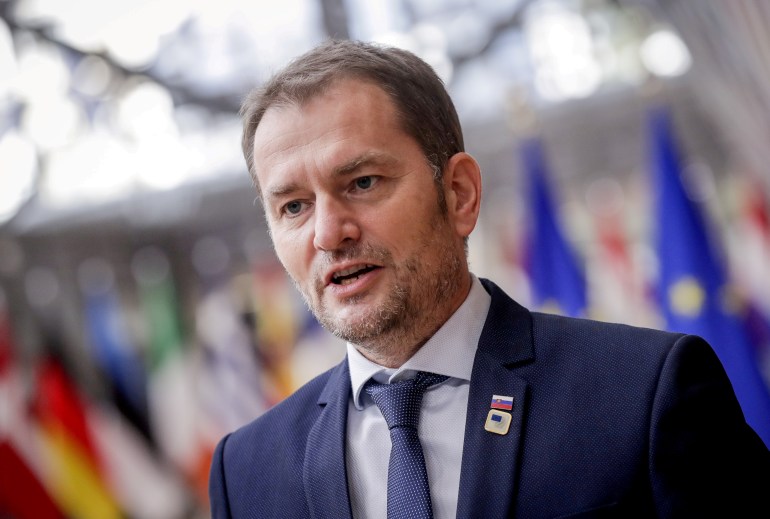Slovakia’s government loses parliamentary no-confidence vote
The fall of the coalition government is the latest stage of the ongoing political crisis, and could pave way for early elections.
Slovakia’s minority coalition government has lost a vote of no-confidence in parliament that was called by the opposition following months of political crisis, and this could lead to snap elections.
On Thursday, 78 lawmakers in the 150-member parliament voted to remove the three-party government of Prime Minister Eduard Heger, heightening political instability as the country battles soaring energy prices and a weakening economy.
The vote was called by a former coalition partner, the Freedom and Solidarity (SaS) party, which quit the government in September over disagreements with Igor Matovic, the leader of the strongest party in the alliance.
President Zuzana Caputova will have to appoint a new prime minister, but could ask Heger’s administration to remain in office in a caretaking capacity, with limited powers, until early elections can be held, which would need a two-thirds parliamentary majority to go ahead.
Parliamentary elections are not scheduled until February 2024.
Holding early polls could have an impact on the small European Union and NATO member’s support for war-torn neighbouring Ukraine, especially if it brings to power the leftist opposition, which is critical of military support for Kyiv as well as EU sanctions against Russia.
Simmering political turmoil
Heger’s coalition lost its majority in September when the SaS quit the ruling alliance because of a row with Matovic’s ruling Ordinary People and Independent Personalities (Olano) party.

SaS joined the leftist opposition in bringing the no-confidence vote, accusing the government of not helping people cope with high energy costs.
The political tensions since SaS’s exit from government prevented support for Heger’s 2023 budget plan, which includes spending to offset energy prices.
SaS said it wasn’t willing to stay in government because of disagreements with Finance Minister Matovic, a populist leader and Olano chief.
Earlier on Thursday, Matovic offered to quit as finance minister if SaS withdrew its no-confidence motion against the government and backed its budget plans, but SaS rejected the deal.
SaS had given the prime minister an ultimatum to reshuffle the cabinet and govern without Matovic or warned that its four ministers would resign.
“For half a year we have witnessed constant chaos and an unacceptable style of governance. This government does not deserve our trust,” said SaS head Richard Sulik, who accused the government of incompetence.
Sulik clashed with Matovic on various issues including how to tackle soaring inflation driven by high energy prices because of Russia’s invasion of Ukraine.
“It’s the best possible Christmas present for the people of Slovakia,” former Prime Minister Peter Pellegrini, who heads the leftist opposition Voice – Social Democracy party, said of the result of the vote.
After winning the election on an anti-corruption ticket two years ago, Matovic struck a deal to govern with SaS, the conservative For People party, and We Are Family, a populist right-wing group that is allied with France’s far-right National Rally party.
Last year, amid the coronavirus pandemic, the government collapsed as Matovic was forced to resign as prime minister after he orchestrated a secret deal to acquire two million doses of the Russian-made Sputnik V vaccine despite disagreement among his coalition partners.
The same four parties formed a new government under Heger, a close ally of Matovic’s and the deputy head of Olano.




